|
Once again Star Trek managed to gather a larger than normal size audience for
the debut of yet another spinoff, opening with an impressive first story.....
yet somehow this manages to feel a bit less impressive than the pilot story
of The Next Generation, or that of Deep Space Nine, or Voyager. Though there is
great satisfaction to be had in discovering this "future history" Trek universe of 2151 A.D.,
and the intricacies of plot that are afoot, this pilot doesn't quite ignite the
same interest in its cast of regular characters as other series have with their
opening stories.
Retroactive Crew
Most American "1 hour" TV dramas have an insipid habit of only crediting major guest actors
over the opening action without mentioning who plays which role, and unless you get access
to behind-the-scenes info, or become familiar with each actor's work over a number of appearances,
audience members may never be able to figure it out. "Star Trek: Enterprise" somehow decided
to be the first Trek spinoff to expand this problem into the title sequence and not list each
regular character's name or face along with the actor's opening credit. I watched years of this show
without really knowing which regular actor played which main character. And though each regular
has a scene or two focusing on them, they don't always contain very definitive material.
The names Trip, Travis, and Trinneer all sort of fused together in my head, and I found it hard
to follow which name belonged to which face.
The one character I immediately got on board with was Hoshi, mostly because I enjoy studying
the grammar of foreign languages and what it can reveal about a culture. She gets a really nice scene
where Archer uses language to tempt her into the early launch, revealing a passion in her which I share.
Excellent. Most Trek shows have an unseen "universal translator" rendering all dialogue into English
for audience convenience, which often robbed aliens of a sense of cultural uniqueness. In this show,
the translator is a rough prototype, and linguistic experts like Hoshi are in greater demand.
I loved that move, and looked forward to how it might make this show different. Perhaps culture would
matter more here than in other Trek shows.
Most attempts to explore character in this pilot story focus on the festering prejudices between
Humans and Vulcans. Captain Archer seems at times to be single-mindedly consumed by this, while
most other characters are similarly afflicted at least to some degree. But is this definitive material
for these characters and societies at this point in time? It's hard to believe that Earth did away with
poverty, war, and most other conflicts if the population is still so prone to these kinds of prejudices.
At times, Archer's anger at the Vulcans seems as juvenile as blaming them for not doing his father's life work
for him - a stance which is already out of fashion today in enlightened circles.
In the end, such issues don't feel definitive for these characters. It feels instead like the writing team
is continuing to do what they often did on "Star Trek: Voyager", which is to retroactively invent character
traits and history just to facilitate the one story they are currently working on, and then conveniently
forget the existence of the entire issue and its history one week later. Indeed, Human/Vulcan prejudice
resolves itself on board Enterprise in this story, in a nicely Trekkian way mind you, without really making
us believe that the answer evolved naturally out of the unnatural place we were in just prior. It feels
a bit more like the all-too-convenient Voyager-style quick fix. And it leaves us not quite knowing
what to look forward to in these characters in the following weeks.
Looping Into Reverse
The greatest cause for concern about this new series was the double-edged sword of setting it
in Star Trek's past, about half-way between
Zephram Cochrane's first warp flight in 2063 and
the adventures of James T. Kirk and company in The Original Series in the mid-2200's.
Sure this was a fascinating time-period to explore, and would undoubtedly produce some
fascinating stories. But success in this arena seemed better suited to one-off adventures,
as with Star Trek 8: First Contact, or a carefully plotted
mini-series with a limited number of episodes. The danger of parking
a regular series here full time, written by essentially the same staff that had just come off
of the recently completed
Star Trek: Voyager series, is that both they and the audience
already know far more about this universe than their protagonists. No doubt it would be hard
to find very many significant unknowns for them to explore. Plus, many worthy concepts
that the writers came up with would have to be curbed to fit into the established chronology.
No Romulan could show himself to any Human or Vulcan, to preserve the reveal in The Original Series,
which pretty much cancels out all worthy Romulan story ideas. The Ferengi needed to largely
remain unknown as well. And a Borg story would be unthinkable.
But of course, with this being sci-fi, the writers would probably try to find ways to bend the rules,
merely making the Trek universe that much less credible.
In philosophical terms, it also meant that the franchise was taking a step backwards.
I've often argued that the Prime Directive was a clumsy 1960's attempt at removing manipulative
political interference from Starfleet's charter, as it then proceeded to empower them
to use manipulation to deceive those same cultures while keeping their own true nature a secret.
Honesty would be a step forward. But now Star Trek had retreated
to a time long before the Prime Directive had come into being. I didn't look forward to watching
these characters unsuccessfully struggle to catch up to the Prime Directive, when it was long past time
that Star Trek television dramas take the next step forward. With "Enterprise", it seemed that
philosophy was pre-destined to remain a bit backwards.
In short, I believe the concept of "prequels" to be a poor direction for any narrative franchise.
Stories should largely move forward, not back. For "Enterprise", sustaining interest in this time period
for the long-term would no doubt become a hefty challenge, particularly if the previous spinoffs' focus
on character was by design not slated to be repeated here.
To the pilot's credit, it introduced a new species to challenge this crew: the Suliban,
a race we'd never heard of before, with abilities that we'd never seen before, but abilities
that didn't quite outdo those of many races that Humans were scheduled to encounter much later.
But, before this pilot had reached its first commercial break, it was revealed that these Suliban
were taking orders from a mysterious figure from the future. The writers had already caved,
pulling their first cheat from the future universe that they were more familiar with. With
Brannon Braga in charge of the show, how could they resist?
The mysterious figure immediately reminded me of a similar one in
"The Mind's Eye", which led up to a spectacular and shocking reveal two episodes later at the end of
The Next Generation's fourth season. I began to get similarly excited about the identity
of this figure, assuming it must be a character we would recognize from a previous Star Trek
series. To my surprise, the character's identity was not revealed at the end of the pilot.
This was to be an ongoing mystery. As "Enterprise" continued, so did the sparse and occasional
teasers as to the identity of this dark puller of strings.... and my feeling was that an arc
that could have worked well if kept short (as TNG had done) was being dragged on into the next example
of "Gilligan's Island Syndrome" - a goal that would remain unachieved for the length of the
entire series, a promise from the writers that they would intentionally never deliver.
I never did watch all of "Enterprise" in its initial run - Season Three was the only season
that kept me tuning in episode after episode. For years afterward, I didn't know if they ever
did reveal who this guy was - and I had stopped caring. From my perspective, this whole mystery
(which had great potential) really flopped in the end.
Temporal Cold War
Partly for mystery, the motivations of our Suliban villains and their dark master from the future
are not fully revealed to us. Instead, we simply hear a lot of talk about a
"temporal cold war", a phrase that will often be repeated anytime that this long-term plot strand
raises its head. At this stage, we don't really know what it is. But all the most likely ideas
point to most of the popular misperceptions about time that were then entrenched in Star Trek
mythology after 9 theatrical films and 25 seasons of various TV shows. We can guess that the dark figure
from the future is somehow concerned about the past, either desperate to preserve it as he remembers it,
or desiring to change it, thinking either way that events in that past might change his "present" by
some sort of magic. Under the more elegant model of time that doesn't require visible magic to make
itself work, all versions of past and present coexist with each other. The past can neither threaten
your present, nor make any alterations to it. A "new" past can at most explain the history of your doubles
in an alternate universe, doubles who already exist. Breathe easy; you're safe. The solution to your
troubles and desires is in your present. Be in the now.
Of course, misperception about temporal theory can still work excellently as a character flaw,
particularly for a villain's nefarious schemes. I just get upset when writers buy into the flaw themselves
and weave it into the actual fabric of the universe they create. As this pilot story ends, it remains way
too early to tell which way Berman and Braga will fall on this issue. Their track record so far on
Star Trek hasn't been that great, but has had moments of substantial promise
here and
there. Although
Archer does get a scene or two in the chamber where the lead Suliban character (too bad I couldn't tell
you from this pilot either the character's or actor's name) usually talks to the future mystery man,
and there is a confrontation, not much of significance happens here, either in terms of discovering answers
or witnessing decisive actions. Our protagonists on the Enterprise thus remain completely in the dark concerning
the latest time travel conundrum from Braga. I often regard it as a mistake to let your protagonists fall
too far behind the audience, although in this case, we the audience may not be as far ahead as we feel
we should be either.
Still, this time travel cold war did not seem like a GREAT choice for a long-term plot for this series.
Instead the potential I saw here was merely that most of this series' big "mythological" stories
would turn out to be very SILLY, misplacing motivation and emotion and stakes on some theories of time that
wouldn't continue to hold up as audiences gradually learned more about how things really work in the real world.
I'd have preferred something that these characters could really sink their teeth into, without the constant
threat of buggering up all the other Star Trek shows that we already love.
Rigel 10
One area in which Berman and Braga don't seem to have done enough research is in astronomy.
It seems they did study the continuity of the original Star Trek, and largely used Rigel 10 as
one of their main settings here BECAUSE planets in the Rigel system were so often used in the
The Original Series. In the first pilot "The Cage", Rigel 7 had been visited by Captain Pike before it
was recreated as his first virtual fantasy. Much of the fourth episode "Mudd's Women" takes place
at Rigel 12. It's a good place for Star Trek to become familiar with early on, so good move.
What isn't good at all is that the Human characters act like they've never heard of the place
before. Rigel is one of the brightest and most recognizable stars in our sky, and since it is
actually very big and very far away, it will be one of the brightest stars in any sky as viewed
from most places in our corner of the galaxy. It was known to the ancients. The positions of the
pyramids in Egypt are built to precisely correspond to the position of Rigel and its neighbours
in the Orion constellation. Every space traveller and Starfleet cadet in this time
period should be very well familiar with what it is.
Titles and Music
"Star Trek: Enterprise" often takes flak for its very different title sequence, but I don't
mind at all that they went for something different. Visually, the sequence is very effective at evoking
the pioneer spirit of exploration and showing a progression of history. It's very cool to see actual
footage of America's first man in space Alan Sheppard giving the audience a knowing and encouraging
wink every week, and great to see the prototype space shuttle showing off the name Enterprise,
hinting at how Star Trek and NASA continue to inspire each other in a positive loop. Footage
from Zephram Cochrane's first warp flight is also lovely continuity, helping to establish the
flow of design as centuries of invention flash by in montage.
|
The title music has been a real focal point of fan criticism, but to me the negative points
are all in the rendition and not the actual composition.
I'm typically not fond of vocal music, usually because it's rare to find lyrics truly worthy of
repeat listening, but in this case I think the lyrics are inspiring and quite good.
What's not so good is the actual singer, whose voice seems raspy and burnt out. Added
to the fuzzy distortion of the electric guitar, the actual musical tone of each note
isn't being expressed very clearly, and the rhythms are a bit lost.
Predictably, I much prefer instrumental versions of this theme song.
A good rendition of this theme music reveals that it is very nicely tuneful,
one of the best melodies on any Star Trek series in fact. In particular,
I have grown quite attached to the full orchestral treatment from the Prague Philharmonic
found on the CD to the right. Its arrangement is based on the instrumental version
that can be heard on the closing credits of this pilot story, but the Prague Philharmonic
has embellished it and made it much more full and enjoyable.
|
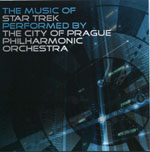
|
Star Trek
City of Prague
Philharmonic
re-recorded music soundtrack.
Audio CD
Find out more....
|
|
|
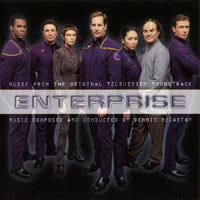
|
Star Trek - Enterprise
Broken Bow
Original soundtrack
music composed by
Dennis McCarthy
Audio CD
Find out more....
|
|
|
Dennis McCarthy was, not surprisingly, the reliable Star Trek veteran called upon to score
this story. His most significant composition here was "Archer's Theme", which embodies the nobility
and wonder of this first Human exploration of space. This theme graces the most emotional moments
of the pilot story and went on to become the closing theme of the show in later episodes. It's a very
nice piece of music. We will also find some interesting percussive work for the Klingon chase at
the beginning of the story, but for most of the other action, it is the restrictions that Berman
placed on Star Trek music that still rule the day and produce mostly a boring bland mush
of material for most action scenes. As far as the latest Star Trek spinoffs go, it was par for
the course, and a bit less than most fans had hoped for.
|
All in all, Enterprise's first story was a pretty good one. Though we were all curious about
what might come next, it was not clear exactly how good this show would be week after week
or exactly where it could or would go....
Read the next In-depth Analysis Review:
"Fight or Flight"
|
|



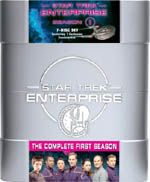
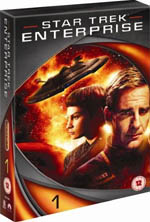
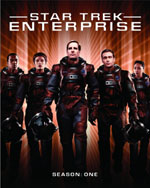


 slimline
slimline U.S.
U.S. Canada
Canada U.K.
U.K.


